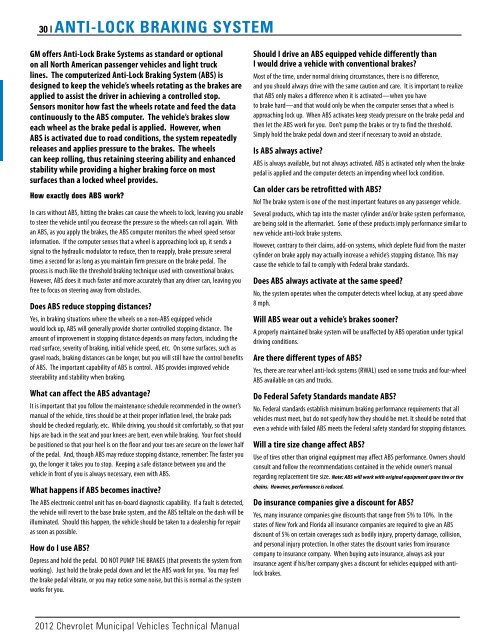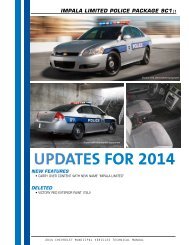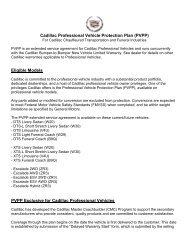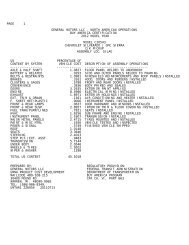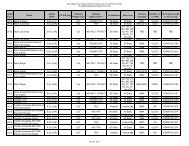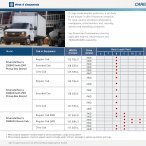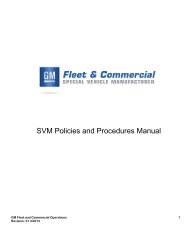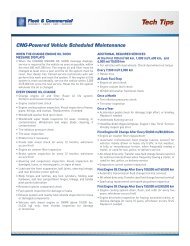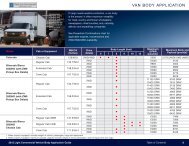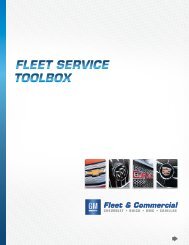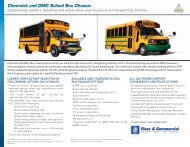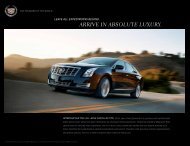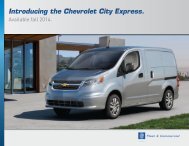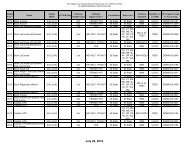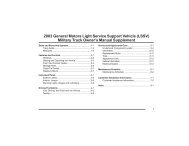2012 Chevrolet Police Technical Manual (pdf) - GM Fleet
2012 Chevrolet Police Technical Manual (pdf) - GM Fleet
2012 Chevrolet Police Technical Manual (pdf) - GM Fleet
Create successful ePaper yourself
Turn your PDF publications into a flip-book with our unique Google optimized e-Paper software.
30 | aNtI-Lock brakINg systEm<br />
<strong>GM</strong> offers Anti-Lock Brake Systems as standard or optional<br />
on all North American passenger vehicles and light truck<br />
lines. The computerized Anti-Lock Braking System (ABS) is<br />
designed to keep the vehicle’s wheels rotating as the brakes are<br />
applied to assist the driver in achieving a controlled stop.<br />
Sensors monitor how fast the wheels rotate and feed the data<br />
continuously to the ABS computer. The vehicle’s brakes slow<br />
each wheel as the brake pedal is applied. However, when<br />
ABS is activated due to road conditions, the system repeatedly<br />
releases and applies pressure to the brakes. The wheels<br />
can keep rolling, thus retaining steering ability and enhanced<br />
stability while providing a higher braking force on most<br />
surfaces than a locked wheel provides.<br />
How exactly does ABS work?<br />
In cars without ABS, hitting the brakes can cause the wheels to lock, leaving you unable<br />
to steer the vehicle until you decrease the pressure so the wheels can roll again. With<br />
an ABS, as you apply the brakes, the ABS computer monitors the wheel speed sensor<br />
information. If the computer senses that a wheel is approaching lock up, it sends a<br />
signal to the hydraulic modulator to reduce, then to reapply, brake pressure several<br />
times a second for as long as you maintain firm pressure on the brake pedal. The<br />
process is much like the threshold braking technique used with conventional brakes.<br />
However, ABS does it much faster and more accurately than any driver can, leaving you<br />
free to focus on steering away from obstacles.<br />
Does ABS reduce stopping distances?<br />
Yes, in braking situations where the wheels on a non-ABS equipped vehicle<br />
would lock up, ABS will generally provide shorter controlled stopping distance. The<br />
amount of improvement in stopping distance depends on many factors, including the<br />
road surface, severity of braking, initial vehicle speed, etc. On some surfaces, such as<br />
gravel roads, braking distances can be longer, but you will still have the control benefits<br />
of ABS. The important capability of ABS is control. ABS provides improved vehicle<br />
steerability and stability when braking.<br />
What can affect the ABS advantage?<br />
It is important that you follow the maintenance schedule recommended in the owner’s<br />
manual of the vehicle, tires should be at their proper inflation level, the brake pads<br />
should be checked regularly, etc. While driving, you should sit comfortably, so that your<br />
hips are back in the seat and your knees are bent, even while braking. Your foot should<br />
be positioned so that your heel is on the floor and your toes are secure on the lower half<br />
of the pedal. And, though ABS may reduce stopping distance, remember: The faster you<br />
go, the longer it takes you to stop. Keeping a safe distance between you and the<br />
vehicle in front of you is always necessary, even with ABS.<br />
What happens if ABS becomes inactive?<br />
The ABS electronic control unit has on-board diagnostic capability. If a fault is detected,<br />
the vehicle will revert to the base brake system, and the ABS telltale on the dash will be<br />
illuminated. Should this happen, the vehicle should be taken to a dealership for repair<br />
as soon as possible.<br />
How do I use ABS?<br />
Depress and hold the pedal. DO NOT PUMP THE BRAKES (that prevents the system from<br />
working). Just hold the brake pedal down and let the ABS work for you. You may feel<br />
the brake pedal vibrate, or you may notice some noise, but this is normal as the system<br />
works for you.<br />
<strong>2012</strong> <strong>Chevrolet</strong> Municipal Vehicles <strong>Technical</strong> <strong>Manual</strong><br />
Should I drive an ABS equipped vehicle differently than<br />
I would drive a vehicle with conventional brakes?<br />
Most of the time, under normal driving circumstances, there is no difference,<br />
and you should always drive with the same caution and care. It is important to realize<br />
that ABS only makes a difference when it is activated—when you have<br />
to brake hard—and that would only be when the computer senses that a wheel is<br />
approaching lock up. When ABS activates keep steady pressure on the brake pedal and<br />
then let the ABS work for you. Don’t pump the brakes or try to find the threshold.<br />
Simply hold the brake pedal down and steer if necessary to avoid an obstacle.<br />
Is ABS always active?<br />
ABS is always available, but not always activated. ABS is activated only when the brake<br />
pedal is applied and the computer detects an impending wheel lock condition.<br />
Can older cars be retrofitted with ABS?<br />
No! The brake system is one of the most important features on any passenger vehicle.<br />
Several products, which tap into the master cylinder and/or brake system performance,<br />
are being sold in the aftermarket. Some of these products imply performance similar to<br />
new vehicle anti-lock brake systems.<br />
However, contrary to their claims, add-on systems, which deplete fluid from the master<br />
cylinder on brake apply may actually increase a vehicle’s stopping distance. This may<br />
cause the vehicle to fail to comply with Federal brake standards.<br />
Does ABS always activate at the same speed?<br />
No, the system operates when the computer detects wheel lockup, at any speed above<br />
8 mph.<br />
Will ABS wear out a vehicle’s brakes sooner?<br />
A properly maintained brake system will be unaffected by ABS operation under typical<br />
driving conditions.<br />
Are there different types of ABS?<br />
Yes, there are rear wheel anti-lock systems (RWAL) used on some trucks and four-wheel<br />
ABS available on cars and trucks.<br />
Do Federal Safety Standards mandate ABS?<br />
No. Federal standards establish minimum braking performance requirements that all<br />
vehicles must meet, but do not specify how they should be met. It should be noted that<br />
even a vehicle with failed ABS meets the Federal safety standard for stopping distances.<br />
Will a tire size change affect ABS?<br />
Use of tires other than original equipment may affect ABS performance. Owners should<br />
consult and follow the recommendations contained in the vehicle owner’s manual<br />
regarding replacement tire size. Note: ABS will work with original equipment spare tire or tire<br />
chains. However, performance is reduced.<br />
Do insurance companies give a discount for ABS?<br />
Yes, many insurance companies give discounts that range from 5% to 10%. In the<br />
states of New York and Florida all insurance companies are required to give an ABS<br />
discount of 5% on certain coverages such as bodily injury, property damage, collision,<br />
and personal injury protection. In other states the discount varies from insurance<br />
company to insurance company. When buying auto insurance, always ask your<br />
insurance agent if his/her company gives a discount for vehicles equipped with antilock<br />
brakes.


